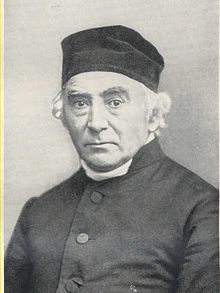Karl Meinhold
Karl Heinrich Joachim Meinhold (born August 21, 1813 in Liepe (Usedom) , † July 20, 1888 in Cammin ) was a Lutheran theologian , cathedral pastor and superintendent in Cammin and leader of the Neuluthertum .
Live and act
Karl Meinhold was born as the son of pastor Georg Wilhelm Meinhold (1767–1828) and his second wife Friederike Matthias (* 1784). The young Meinhold - like his brother Wilhelm - had his first lessons with his father until he went to the Marienstiftsgymnasium in Stettin in 1818 .
In 1832 Meinhold began studying theology at the University of Greifswald and continued it at the University of Halle and the University of Berlin . In 1834 he passed the first theological exam in Stettin. During his studies he became a member of the old Greifswald fraternity / Arminia in 1831 and of the old fraternity Germania Halle in 1832 .
In the same year he became a private tutor in Nemerow in Mecklenburg-Strelitz and in 1837 took the same position in Clempen in Western Pomerania . With the second theological exam in Stettin he gave up this position.
In 1838 Meinhold was appointed pastor to the parish in Kolzow on the island of Wollin . Here he met the Lutherans who were pushing for separation, who gained influence and, in their resistance to the Union, lured many citizens away from the Prussian regional church. For Meinhold, that was reason enough to ask the question of confession from scratch. He eventually became a staunch fighter for Lutheran doctrine himself, but within the United Church . The pietistic approach of his thinking, which originated from his studies in Halle, allowed him to force the scriptures and confession of the Lutheran Church also within the United Church. Meinhold joined the Lutheran Association and always emphasized his motto: "No denomination without Pietism, no Pietism without denomination".
In 1852 Meinhold became pastor at the cathedral and cathedral church of St. Johannis in Cammin and at the same time superintendent of the Synod of Cammin. Together with his then ministerial brother Wangemann and the cantor Rautenburg, he gave the services there a richer, Lutheran liturgical orientation. In 1856 he took over the leadership of the Lutheran Society , and the Camminer autumn conferences became a meeting point for those with like-minded people who also valued his lively personality.
In 1868, the consistory of the Pomeranian Province in Stettin, which had been skeptical of its activities for a long time, initiated an investigation against Meinhold, which resulted in his removal from office as superintendent "because of continued violation of the duties of obedience and deference incumbent on him in his church Upper ”resulted. But the impeachment was suspended and in 1874 repealed by royal decision. But in the same year new allegations were made against Meinhold, so that the impeachment could be enforced. It was not until 1880 that the superintendent was transferred to him again.
In the Luther year of 1883, the 400th year of the Reformer's birth, the Theological Faculty of the University of Greifswald awarded Karl Meinhold his theological doctorate.
On July 20, 1888, Meinhold's 50th anniversary in office was celebrated in Camminer Cathedral, but without the sick boy who was at home. He died on the same evening at the age of 75.
Karl Meinhold married Mathilde Golle from Stettin († 1850) in his first marriage in 1838, and Marie Schulz in 1851. From both marriages he had 14 children, of which ten sons and one daughter survived.
Fonts
- Union and Lutheran Church in the old eastern provinces of the Prussian state . 1867. (published anonymously)
- Ezer . Anklam 1885. (Gospel sermons)
literature
- Helge Dvorak: Biographical Lexicon of the German Burschenschaft. Volume I: Politicians. Sub-Volume 4: M-Q. Winter, Heidelberg 2000, ISBN 3-8253-1118-X , pp. 71-72.
- Paul Meinhold: Karl Meinhold. In: Pommersche Lebensbilder II. Saunier, Stettin 1936, pp. 93-102.
- Th. Meinhold: Life picture of D. Karl Meinhold. A piece of Pomeranian church history . Berlin 1899.
- Hermann Petrich : Meinhold, Karl Heinrich Joachim . In: Allgemeine Deutsche Biographie (ADB). Volume 52, Duncker & Humblot, Leipzig 1906, pp. 303-305.
| personal data | |
|---|---|
| SURNAME | Meinhold, Karl |
| ALTERNATIVE NAMES | Meinhold, Karl Heinrich Joachim (full name) |
| BRIEF DESCRIPTION | Lutheran theologian, cathedral priest and superintendent in Cammin and leader of Lutheran Orthodoxy |
| DATE OF BIRTH | August 21, 1813 |
| PLACE OF BIRTH | Liepe (Usedom) |
| DATE OF DEATH | July 20, 1888 |
| Place of death | Cammin |
